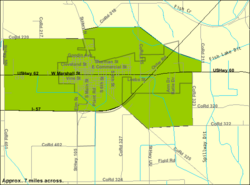Charleston, Missouri
| Charleston, Missouri | |
|---|---|
| City | |
 Location of Charleston, Missouri |
|
 U.S. Census Map |
|
| Coordinates: 36°55′17″N 89°20′47″W / 36.92139°N 89.34639°WCoordinates: 36°55′17″N 89°20′47″W / 36.92139°N 89.34639°W | |
| Country | United States |
| State | Missouri |
| County | Mississippi |
| Area | |
| • Total | 4.86 sq mi (12.59 km2) |
| • Land | 4.80 sq mi (12.43 km2) |
| • Water | 0.06 sq mi (0.16 km2) |
| Elevation | 322 ft (98 m) |
| Population (2010) | |
| • Total | 5,947 |
| • Estimate (2012) | 5,908 |
| • Density | 1,239.0/sq mi (478.4/km2) |
| Time zone | Central (CST) (UTC-6) |
| • Summer (DST) | CDT (UTC-5) |
| ZIP code | 63834 |
| Area code(s) | 573 |
| FIPS code | 29-13366 |
| GNIS feature ID | 0715743 |
| Website | www |
Charleston is a city in Mississippi County, Missouri, United States. The population was 5,947 at the 2010 census. It is the county seat of Mississippi County. It is a home to a local correctional facility.
Charleston is the biggest town on the Missouri side near the confluence of the Mississippi River and Ohio River at Bird's Point, Missouri (11 miles east on U.S. Route 60). Its history has been tied to traffic on the rivers.
Settlement initially occurred on the north side in what in 1805 was called Matthews Prairie.
After purchasing 22.5 acres (91,000 m2) for $337, Joseph Moore laid out Charleston in 1837. Some say the community derives its name from nearby Charles Prairie, while others believe the name is a transfer from Charleston, South Carolina. In 1845, it was selected as the county seat and a post office named Charleston has been in operation since 1847.
The Battle of Charleston was fought on August 19, 1861. Killed in the battle was one Union soldier and thirteen Missouri State Guard soldiers.
On September 1, 1861, Confederate General M. Jeff Thompson robbed the Union Bank of Charleston. Thompson, who handed the cashier a note, gave the cashier an hour to get approval from superiors to give him keys to the vault. After receiving the money, he left a receipt for $57,000 and discovered later that only $56,000 was in the bags.
The city was the epicenter of the October 31, 1895 6.6 earthquake on the New Madrid Seismic Zone. The quake damaged virtually every building in Charleston, creating sand volcanoes and cracking a pier on the Cairo Rail Bridge. In addition, chimneys toppled in St. Louis, Missouri; Memphis, Tennessee; Gadsden, Alabama; and Evansville, Indiana. The fate of specific buildings may also be traced by Sanborn Maps that were produced of the town during this period. This was the largest quake since the 1812 New Madrid earthquake, which measured at 8.3 and was the biggest recorded quake in the Contiguous United States. One of the most visible signs of the quake is located south of Charleston at Henson Lake, which was greatly expanded by the quake.
...
Wikipedia
